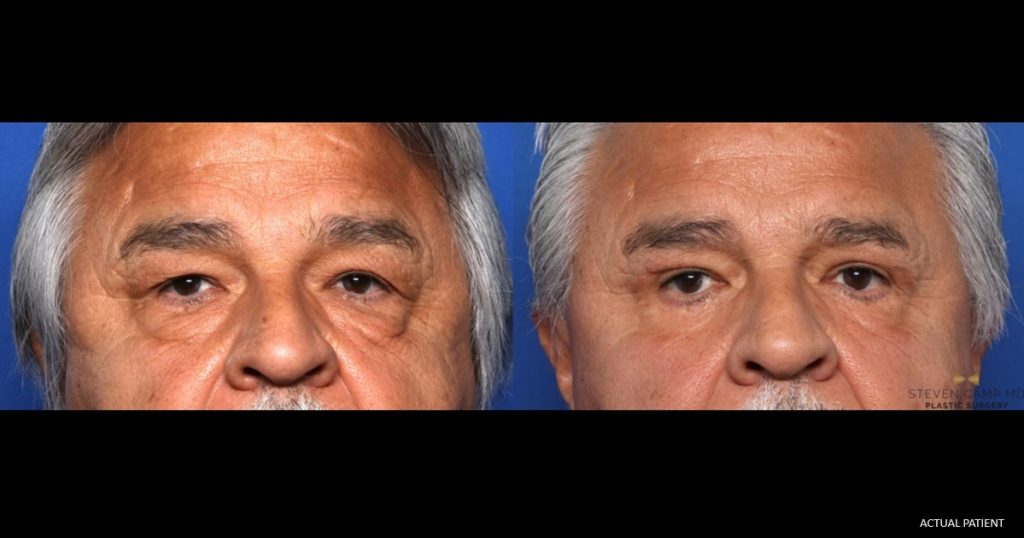Blepharoplasty, also known as eyelid surgery, is one of my favorite procedures to perform at my Fort Worth plastic surgery practice. This transformative procedure can impact the appearance of your entire face, not just your eyes.
To help you achieve the best possible results, I’ve prepped some pre- and post-operative tips and recovery timeline details to help you prepare for your blepharoplasty procedure.
Eyelid Surgery Pre-Operative Instructions
Medications to Avoid
Discontinue all blood thinning medicines 2 weeks before your surgery. These medicines include: aspirin, Motrin, Advil, Aleve, Excedrin, and Bufferin. (Please call our office about any concerns of a specific medicine not listed.)
For patients taking hormone replacement surgery we recommend stopping these medicines for 2 weeks before and after surgery to optimize healing. If you are taking hormone replacement therapy (HRT) please call your prescribing physician’s office to discuss stopping these medicines before your surgery.
Report Any Changes with Your Eyes
During your consult evaluation we reviewed your eye health history and found you were ready for surgery, however, please let us know if you develop dry eyes or any other eye disorder after the date of our consultation.
Recommended Medications
We recommend that you take recommended medications prior to surgery. The day before surgery we recommend starting oral Vitamin C to assist healing, and Gabapentin and Celebrex to minimize inflammation. Additionally, we recommend the use of Bactroban ointment starting 5 days before surgery and continuing for 2 full weeks after surgery.
Rx to Be Called In By Our Nurses
We will prescribe a combination of medications, including pain medication, antibiotics, and anti-nausea medications to support your post-operative healing. Before surgery, we will conduct a pre-operative consultation with you to walk through your post-care regimen so that you are well informed and prepared to manage your post-operative care at home.
Tips for Prepping for Eyelid Surgery
- Avoid drinking alcohol 2 weeks before and 2 weeks after surgery.
- Avoid drinking herbal teas and supplements 1 week before surgery (ex. St. John’s Wort and echinacea).
- Avoid caffeine 48 hours prior to surgery (no coffee, energy drinks, or caffeinated colas).
- Have nothing to eat or drink 8 hours before surgery. If your procedure is in the afternoon you may have light breakfast, but again allow 8 hours from the time of last eating or drinking and your procedure.
- Wear comfortable clothes the day of your surgery. We recommend wearing button front or zip front clothes.
- Wear cotton underwear the day of your surgery. This may sound unusual but nylon and synthetic fabrics should be avoided in operating or procedure rooms.
- Arrive on time. This helps us avoid delays. We will call you the day before your surgery to tell your specific arrival time.
- Arrange for a responsible adult to be with you and take you home after surgery. No one is allowed to travel home alone after surgery.
- Avoid wearing jewelry on the day of surgery and leave your valuables at home.
- Do not wear contact lenses the day of surgery or for 2 weeks after surgery. Please remove eyelash extensions.
- Bring sunglasses and a hooded sweatshirt or scarf to cover the face after your procedure and minimize sun exposure on the way home.
- Any other questions should be referred to our clinical nursing staff. They are happy to discuss and explain anything to you.
Eyelid Surgery Post-Operative Recovery Instructions
Position: When reclining, elevate your head and back with several pillows for the first 3-5 days after surgery. Lie on your back, rather than on your sides or stomach.
Ice: Ice packs or cool damp wash cloths should be applied on or around the treated areas. This will lessen the amount of swelling, bruising, and pain. If no bandages are present, place a cloth between the skin and the ice pack to protect the skin. Use ice for up to 30 minutes out of each waking hour for the first 24 hours. An easy schedule to follow is 30 minutes on and 30 minutes off. I recommend that you consistently and gently ice the area for the first 5 days after surgery.
Diet: A soft diet is recommended for the first 24 hours. Think soups, pasta without spicy red sauces, yogurts, oatmeal. On the second day, you may begin a diet or easily chewable foods, then you may resume your regular diet.
Activity: During your first post-operative day, you should rest and keep your head elevated. Do not stay in bed all day.
Avoid bending over or lifting more than 5 pounds during the first week.
Take extra precautions to protect your head and neck from bumps, hits or injuries.
Hair Care: You may wash your hair the day after surgery. A mild baby shampoo is recommended.
Cosmetics: You may apply cosmetics to untreated areas following surgery. Avoid any areas with skin stitches, abrasions or laser treatments. Make-up may be applied in the treated areas 7 days after the skin stitches have been removed.
Make-up may delay wound healing and possibly produce a permanent tattoo if it is applied to the treated areas too soon.
Exercise/ Sports: Low intensity walking is permitted during the first week. No swimming, gym, or strenuous activities for 3 weeks.
Sun Exposure: Protect your facial skin from excessive sun exposure while the treated area(s) are still pink. When the treated area(s) are no longer pink, ordinary exposure is not harmful, but a sunscreen should always be used.
Medications: Take one tablet of your prescription pain medication when you arrive home. Additional tablets may be taken once every 4-6 hours as needed for pain. CAUTION: do not drive or operate machinery while taking pain medications. Take with food or liquid to avoid nausea. The pain medications I recommend are Celebrex and Gabapentin both to be taken scheduled every 12 hrs. with food and 8 oz. of water. I do recommend you start taking these medicines the day before surgery.
Tylenol may be taken as directed in place of prescription pain medications. Avoid all other pain medications (e.g., aspirin, Aleve, ibuprofen) as they may cause excessive bleeding.
I generally prescribe a 5-day supply of Cephalexin antibiotics. You will most likely be taking one tablet 3 or 4 times a day. Start taking them the day before surgery and take them until they are gone.
I recommend taking 1 Zofran or Emend tablet the night before surgery for nausea, and only as needed after surgery. We will determine which prescription is correct for you.
Caring for Eyelid Stitches
Supplies needed:
Patients should have the following items at home BEFORE surgery to aid recovery:
- Polysporin, Aquaphor, Vaseline, or Bacitracin ointment or a prescribed eye ointment such as erythromycin or tobramycin ophthalmic ointment. (Tobrex 0.3% is my preference unless allergy or other reason.)
- Cotton tipped applicators (Q-Tips, etc.).
- 3% Hydrogen Peroxide, fresh bottle.
Instructions:
- Mix 2 Tbsp. peroxide with 2 Tbsp. tap water in a small container. Discard each time, do not save mixture.
- Use Q-tips and peroxide solution to clean all blood and material from the incisions. DO NOT leave any crusts or blood on the stitched areas. Repeat a minimum of 4-5 times per day. Clean incisions from side to side, not up & down.
- Cover ALL incisions and abrasions with a thin layer of ointment – DO NOT allow ANY areas to dry out or scab over.
- Do not apply any bandages or other materials to the surgical area unless otherwise instructed.
PLEASE REPORT ANY OF THE FOLLOWING TO OUR OFFICE:
- Sudden or excessive bleeding, swelling, or bruising.
- Any itching, rash or reaction to medications.
- Fever, temperature over 100.4 degrees.
- Mild blood tinge discharge from the incisions is normal, but excessive drainage or off smelling yellow drainage is not.
- ANY INJURY to the face.
FAITHFUL ADHERENCE TO PRE- OPERATIVE AND POST-OPERATIVE INSTRUCTIONS WILL HELP TO MINIMIZE SWELLING, PAIN AND DISCOMFORT. IF YOU DO HAVE PROBLEMS, PLEASE DO NOT HESITATE TO CONTACT OUR OFFICE AT [PHONE] FOR ASSISTANCE.
Schedule Your Blepharoplasty Consultation Today
Take the next step. Schedule your blepharoplasty consultation by calling (817) 228-4315 or request a consultation online to meet with me to learn how eyelid surgery can help improve your appearance and restore your confidence.


Leave a Reply